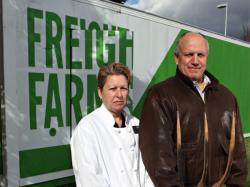Field Of Greens: From Parking Lot To Table
November 12, 2013 | 3 min to read

Concord NH — Concord, N.H. entrepreneur Steve Duprey is no stranger to firsts. At 19, for example, he became the country’s youngest elected state representative. As a former chair of the New Hampshire Republican Party and national committeeman Duprey has been central in saving the Granite State’s first in the nation presidential primary.
He scored another first today when a tractor trailer unloaded a 40-foot long freight container in the parking lot of the Courtyard Marriott Grappone Conference Center making it the first hotel in North America to be able to grow all its own organic salad greens on premises.
The Leafy Green Machine, as it is called, is the first delivered to New Hampshire by Boston-based start-up Freight Farms. The “farm” is made of a recycled, insulated freight container 40 feet long by eight feet wide and 12 feet tall.
The container houses a high-tech infrastructure that will allow the Grappone Center to grow leafy greens, such as lettuce, kale, spinach, arugula, basil, oregano and sprouts hydroponically.
Hydroponics is a method of growing plants using mineral nutrient solutions, in water, without soil. Plants absorb their essential mineral nutrients in water. In natural conditions, soil acts as a mineral nutrient reservoir but the soil itself is not essential to plant growth. Almost any terrestrial plant will grow with hydroponics.
“In five weeks, we’re going to have all the greens we need to support our guest services,” says Duprey. “From parking lot to table,” he jokes.
So, the next logical question might be, “Why would a hotel grow its own food?”
Duprey, considered a maverick in the style of John McCain, whose presidential campaign he chaired twice, owns two Marriott-branded hotels in Concord and is not your typical 60-year old republican businessman.
He already has 30,000 bees living on the roof of his conference center, that produce all of the honey the center needs for its kitchens and guest events. One of his other hotels in Concord is the first in the Northeastern U.S. with pervious (as opposed to impervious) pavement for its parking lots. This allows storm water to filter through the pavement, reducing runoff, trapping suspended solids and filtering pollutants.
His hotels feature electric car charging stations. (Duprey, himself, drives a micro Smart Car with the license plate “SMARTIE.”)
So, again, the question is, “Why put a hydroponic garden in the parking lot?”
“It’s simple. We’re moving where our market is headed,” says Duprey. “Our goal is to be the greenest hotel and conference center in America, and this is an important step in getting us there. Our guests want organic, they want local, they want to patronize a sustainable business that’s taking steps to reduce its carbon footprint. ”
That’s typical of Duprey, according to Stephen Heavener, executive director of Concord Regional Development Authority, which is providing funding for this project and has backed others that Duprey has initiated. “We have faith in Steve and his new, creative, visionary projects,” Heavener says. “He’s got a successful track record.”
Freight Farms, as the self-contained hydroponic gardens are called, are the brain-child of Jon Friedman and Brad McNamara, Boston-based entrepreneurs who are making a business out of eliminating unnecessary economic and environmental costs of “food miles,” as they call them, by producing food locally.
“You can grow in any climate, in any part of the world, in any season,” says Friedman. “A head of lettuce in the grocery store has traveled pretty far to get to your plate,” he says. “This eliminates that the transportation carbon impact of sending produce in a refrigerated truck from one side to the continent to the other. No matter where you are, you can have local produce.”
Operating the Leafy Green Machine in the Grappone Center’s parking lot requires minimal training. “Even I can do it,” Duprey says.
The container is equipped with technology which automatically waters, feeds and lights the plants. All the Grappone Center’s “gardener” has to do is monitor the unit and operate the technical controls that support the greens and harvest them when they are ready.
Growing greens in the container eliminates any need for pesticides and herbicides while also creating a smaller carbon footprint. Diseases thrive in soil, but because hydroponics only uses water and the container is closed, this is not an issue. And the container is perfect for year-round growing in the cold New Hampshire climate.
Is it going to put local farmers out of business? “No way,” says Duprey. Our challenge is that we have not been able to buy enough organic, locally produced greens, particularly in the winter. We’ll still be buying plenty of produce and cheeses and meat locally.”
What’s next for Duprey and the Grappone Center? Stay tuned.
Source: Freight Farms
